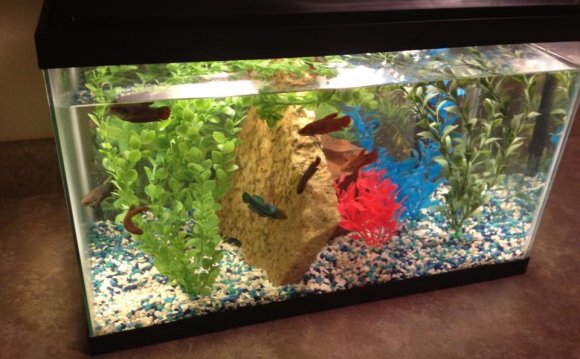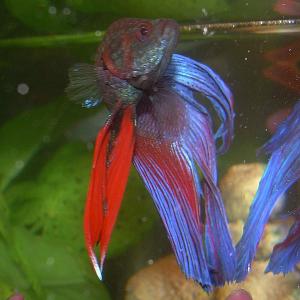
 Custom Search
Custom Search
Keeping a betta (or bettas) can be a rewarding experience provided that you are able to keep your betta healthy.
They are intelligent fish that are aware of their surroundings, and because of this, they are able to "interact" with the person that feeds them (see the video at the end of this article).
What I'd like to discuss in this article is how to keep your betta happy and healthy.
Where to Buy Your Betta
If you want to start off with healthiest bettas then choose a pet store that practices good fish keeping habits.
That said, I must admit I recently purchased several bettas from a huge department store that does NOT keep their fish well. I only went in to pick up some aquarium filter cartridgess and while I was there I noticed bettas kept in plastic containers living in very dirty water. I felt so bad for them that I bought several. I didn't want to support this kind of fish keeping, but I wanted to try to save at least a few of them. I've been keeping fish for 42 years and so I assumed if anyone could save them, I could. They are much happier now in their new home.
In general, it is best to get your bettas from a pet store that at least keeps the bettas in clean water. If you see dead bettas in the bowls then buy elsewhere.
Housing Your Bettas
As most of you probably know, male bettas can only be kept one to an aquarium or container. Do NOT put more than one male betta in a tank or aquarium. EVER. However, male bettas can often be kept in community tanks, unless you have fin nippers in the tank or other unsuitable tankmates. It is okay to keep more than one female betta in the same aquarium. However, you cannot keep a male and female betta in the same tank, unless you are breeding them.
Betta Bowl Care
Keeping your betta in an aquarium with a filter and heater is best. In a perfect world every betta would be kept in a large aquarium. However, I know this isn't going to happen for everyone and so I'm going to discuss betta bowl care as well.
Bettas are often kept in small bowls. They are able to survive because of their labyrinth organ, which allows them to breathe oxygen from the air, as well as the water. In a small bowl with no filtration there isn't much dissolved oxygen in the water, but because your betta can also get some oxygen from the air, it is able to survive in this manner.
Your betta needs access to oxygen from both air and water. It will not survive unless it can breathe water from the air as well as the water. If you cover your betta bowl with a lid there must be air holes present or your betta will suffocate.
If you keep your betta in a bowl, get the biggest bowl you can. Petco sells some fairly inexpensive pet containers that you could keep your betta in. Here is the link if you want to see them (opens in new window): Petco Pet Keepers. If you use these, get the medium or large size if possible.
If you can't put your betta in an aquarium, these pet keepers are often the next best thing. These containers have a lid to keep your betta from jumping out. The lid has plenty of air holes, and part of the lid lifts up for easy feeding access.
How Often Should You Change Your Betta's Water?
If you are keeping your betta in a bowl with no filtration then change the water EVERY day, especially if the bowl is small. Never, ever, go more than 2 days without changing the water in your betta's bowl.
Of course you'll have to be very careful how you do this. The temperature of the new water must be close to the same as the old water. You must also use a fish water conditioner to remove chlorine and chloramine from the water or your fish will die. The temperature should be kept near 80 degrees Fahrenheit (about 26 degrees Celsius). Not so hard in an unheated tank in the summer, but during the winter this will be a challenge.
The best way to change your betta's water is to fill up a glass container with water and let it sit there overnight so it is the same temperature as your betta's old water. In addition, having the water sit helps to condition the water. I'd still use a chlorine/chloramine remover - just in case. You could also use a thermometer to check the temperature of the new water and compare it to the water temp your betta is currently in.
Also, I'd mix a little of the new water in with the old. Wait a few minutes. Then pour out about half of the old water. When I've kept bettas in bowls I've usually poured some of the old water and the betta into a new container. Then rinsed out the betta container. Then put the betta and some of the old water back into the betta container and then added the new conditioned water (rather slowly).
What to Feed Your Betta
Bettas will eat most commercial dry foods, but the dry fish food I like best for bettas is Aqueon Betta Food. The pellets are very small, which makes it easy for your betta to eat them, and it is easy to take out a particular number of pellets and then put only that amount into your betta's tank or bowl.
You'll see many websites advocating feeding your betta only once per day. I feed my bettas twice per day, every day, giving them 3-4 pellets each feeding.
It is best not to feed your bettas tropical fish flakes. One reason is that your betta may not like them and if they go uneaten they will foul the water. The other reason is that with the pellets there is greater control over the amount you are putting in. If you were feeding flakes you could put in only 1 flake, but flakes are typically not all the same size. In contrast, betta pellets are all uniform in size.
Betta pellets are also specially formulated for bettas' nutritional requirements.
Another really good food for bettas is Atison's Betta Food by Ocean Nutrition. I either feed my bettas this or the Aqueon betta pellets. The Ocean Nutrition brand is a little harder to find than the Aqueon pellets.
Bettas Like Variety in Their Diet
Imagine if you had to eat the same meal every day, twice a day, for your entire life. It might get kind of boring.
Bettas also like a little variety in their diet. Frozen or freeze-dried bloodworms are a betta favorite. In some cases, it is the only thing some bettas will eat!
You could also give them a little live or frozen brine shrimp for a little more variety. Whatever you feed them just be sure to feed them sparingly so you don't foul their water and make them sick.









